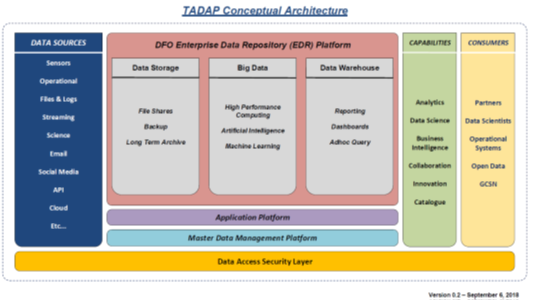Important: The GCConnex decommission will not affect GCCollab or GCWiki. Thank you and happy collaborating!
Difference between revisions of "TADAP"
(adding a diagram) |
|||
| Line 21: | Line 21: | ||
* Demand of new capabilities for Big Data, Artificial Intelligence, Digital Government, Collaboration | * Demand of new capabilities for Big Data, Artificial Intelligence, Digital Government, Collaboration | ||
* New opportunity – new delivery options in the Cloud | * New opportunity – new delivery options in the Cloud | ||
| − | * New momentum from TBS for GC data strategy and governance | + | * New momentum from TBS for GC data strategy and governance |
== Team == | == Team == | ||
| Line 28: | Line 28: | ||
== Stakeholders == | == Stakeholders == | ||
to come | to come | ||
| + | |||
| + | == Architecture == | ||
| + | [[File:TADAP ConceptArchitecture.png|thumb|TADAP Conceptual Architecture]] | ||
'''''<small>Read More</small>:''''' [[:File:MECTS--3936850-v10-TADAP Introduction - DARB 2018 - EN PPTX.PPT|TADAP_PPT]] | '''''<small>Read More</small>:''''' [[:File:MECTS--3936850-v10-TADAP Introduction - DARB 2018 - EN PPTX.PPT|TADAP_PPT]] | ||
Revision as of 14:54, 14 September 2018
Target Architecture for Data and Application Platform (TADAP)
What is TADAP
Data management framework and platform
It will support data governance and provide tools needed to support the entire data management life cycle, including data acquisition, cataloging, transformation, integration, storage and archiving, search and discovery, and collaboration and publishing.
Application framework and platform
It will support the deployment of applications built using commonly used frameworks based primarily on Java and .NET (i.e. MODIP, EFMSI). Support will also be provided for LAMP (Linux, Apache, MySQL, PHP) and Python. The platform will be designed to isolate data assets from computing, making data assets more secure and shareable by multiple applications.
Corresponding infrastructure in the Cloud
DFO will be able to meet the current and anticipated computing needs of the department in a reliable, timely, efficient, and cost-effective manner. The capabilities will exist to scale up or down depending on needs and will be able to accommodate DFO’s data storage and computing needs.
Why TADAP
Internal to DFO
- DFO’s legacy of silo applications and fragmented data makes information not discoverable; difficult to find quality information
- SSC challenges and limitations in setting up the DFO required end-state data centres
- Need to change culture around data governance and stewardship (additional parallel project)
- Meet demand of OPP, Internet of things, continuous increase needs of acquired data volume
External to DFO
- Demand of new capabilities for Big Data, Artificial Intelligence, Digital Government, Collaboration
- New opportunity – new delivery options in the Cloud
- New momentum from TBS for GC data strategy and governance
Team
to come
Stakeholders
to come
Architecture
Read More: TADAP_PPT

